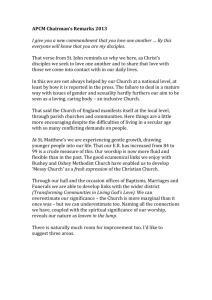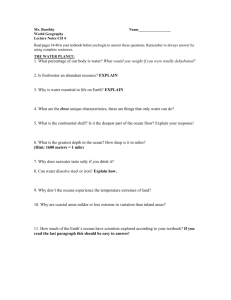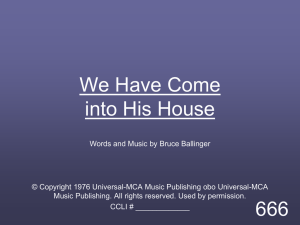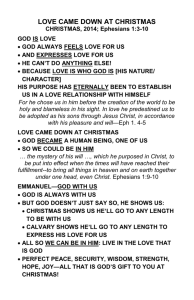The season of creation - St John`s in the City
advertisement
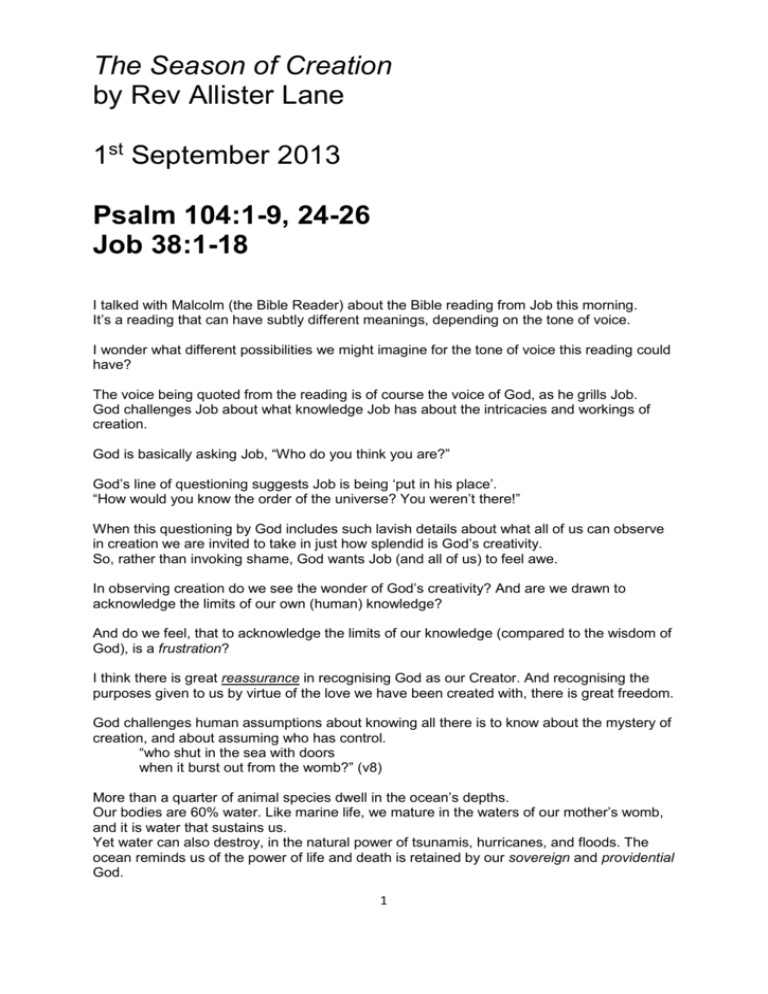
The Season of Creation by Rev Allister Lane 1st September 2013 Psalm 104:1-9, 24-26 Job 38:1-18 I talked with Malcolm (the Bible Reader) about the Bible reading from Job this morning. It’s a reading that can have subtly different meanings, depending on the tone of voice. I wonder what different possibilities we might imagine for the tone of voice this reading could have? The voice being quoted from the reading is of course the voice of God, as he grills Job. God challenges Job about what knowledge Job has about the intricacies and workings of creation. God is basically asking Job, “Who do you think you are?” God’s line of questioning suggests Job is being ‘put in his place’. “How would you know the order of the universe? You weren’t there!” When this questioning by God includes such lavish details about what all of us can observe in creation we are invited to take in just how splendid is God’s creativity. So, rather than invoking shame, God wants Job (and all of us) to feel awe. In observing creation do we see the wonder of God’s creativity? And are we drawn to acknowledge the limits of our own (human) knowledge? And do we feel, that to acknowledge the limits of our knowledge (compared to the wisdom of God), is a frustration? I think there is great reassurance in recognising God as our Creator. And recognising the purposes given to us by virtue of the love we have been created with, there is great freedom. God challenges human assumptions about knowing all there is to know about the mystery of creation, and about assuming who has control. “who shut in the sea with doors when it burst out from the womb?” (v8) More than a quarter of animal species dwell in the ocean’s depths. Our bodies are 60% water. Like marine life, we mature in the waters of our mother’s womb, and it is water that sustains us. Yet water can also destroy, in the natural power of tsunamis, hurricanes, and floods. The ocean reminds us of the power of life and death is retained by our sovereign and providential God. 1 The metaphor of water as both causing death and giving life is a powerful one for Baptism. The text of Job highlights that God is in control as creation is formed in the gathering of elements into a balanced ecosystem. “Thus far shall you come, and no farther, and here shall your proud waves be stopped” (v11) The control over the oceans evokes the promise of God given to Noah and his family after the flood that cleansed the world. Over the next four weeks, we are celebrating God’s creation and the revelation of divine wisdom in all created things. Our worship this morning begins the Season of Creation. And on this first Sunday we have a theme of ‘oceans’ – the untamed and life-giving, powerful, yet fragile oceans of the world. In these first four weeks of September our worship will focus our celebration of God’s wisdom in creation – the oceans, flora and fauna, storms, and the cosmos. The wisdom of God in creation is proclaimed by the poet in the Psalm we heard read this morning: “24 O Lord, how manifold are your works! In wisdom you have made them all; the earth is full of your creatures. 25 Yonder is the sea, great and wide, creeping things innumerable are there, living things both small and great.” (vv24&25) And like the reading from Job, we are offered reassurance of God’s wise control of the elements of creation, with particular mention of the waters... “You set a boundary that they may not pass, so that they might not again cover the earth.” (v9) ...An even more explicit reference to the promise of God given after the great flood. So why are we celebrating this Season of Creation? What is it about? What does it offer us? As the introductory explanation in our bulletin says, we celebrate different seasons through the church year, and if you think about these (Advent, Christmas, Epiphany, Lent, and Easter) the seasons follow the life of Jesus. The Season of Creation is a new season introduced for churches across the world, offering the opportunity to intentionally worship God for the wonders of creation. God is worshipped as the maker of heaven and earth; in other words, all creation. This is what we confessed together this morning: “I believe in God, the Father almighty, creator of heaven and earth.” (Apostles’ Creed) 2 This conviction about creation has great implications for the way we view the world around us. We care for this world, we see beauty in it, we recognise God’s glory expressed in it, we aim to protect it, and we grieve when it is distorted by human abuse and damage. The Season of Creation is a time to focus on the beauty and intricacy of God’s creation and be sure we don’t take it for granted. God forms the elements of creation into a balanced ecosystem. God’s creation is interconnected, joined together in a complex web of related parts. God is in control, holding all these things together – and expects us to help. We know our actions affect the creation within which we live. Creation is affected by climate change, overconsumption, and pollution from fossil fuels. Our actions have dire consequences. And this Season of Creation gives us an opportunity to think about how we might work with God to cherish and protect; not ignore or distort creation. As a worshiping community we have a particularly special opportunity to recognise our relationship with God and God’s creation: 1. to give praise and thanks for creation; 2. to express grief and pain at the abuse, pollution, and distortion of what God has created; 3. to offer prayers for God’s blessing on the natural world, and on our faithful use of provisions God makes available through creation; and 4. to seek wisdom in our efforts to participate in God’s purposes, as caretakers of creation. As important and necessary as our efforts are, we have a much greater reason for hope in the renewal of creation. We celebrate Christ, whose life, death and resurrection is at the heart of God’s creation. Christ is the Lord of all creation.1 The incarnate Christ connects us with Earth. The crucified Christ brings forgiveness for our sins The resurrected Christ inaugurates the new life at the centre of creation; his risen presence opens up God’s power at work renewing and restoring creation. In the Season of Creation we celebrate Christ together with creation, we face the ecological crisis with Christ, and we serve Christ in the healing of creation. In our worship of God we celebrate that Christ is the Lord of all creation, and, in our loyalty to Christ our Lord, we devote our efforts to cherish and protect creation. 1 Colossians 1:15-20: 15 He is the image of the invisible God, the firstborn of all creation; 16for in him all things in heaven and on earth were created, things visible and invisible, whether thrones or dominions or rulers or powers—all things have been created through him and for him. 17He himself is before all things, and in him all things hold together. 18He is the head of the body, the church; he is the beginning, the firstborn from the dead, so that he might come to have first place in everything. 19For in him all the fullness of God was pleased to dwell, 20and through him God was pleased to reconcile to himself all things, whether on earth or in heaven, by making peace through the blood of his cross. 3 Caring for creation then is clearly part of our Christian vocation, as we (the Church) are guided by God’s Holy Spirit in mission and ministry. This week I saw an ad produced by a group called Sustainable Coastlines (copied in your bulletin on page14). Perhaps you’ve also seen this on bus shelters around Wellington. It is highlighting the damage done by litter that flows through drains out to the ocean. Careless littering is polluting the oceans and poisoning our seafood. Every time it rains, littered items like bottle caps, cigarette butts and takeaway packages very quickly flow out to sea. Over time, the waves and sun break rubbish into smaller pieces, which float around accumulating chemicals from the surrounding water. Unfortunately these fragments of litter look a lot like what creatures in the ocean eat. And so this litter enters the food chain. There are selfish interests in preventing our seafood becoming polluted, but also issues of loving our neighbour. In addition to all those who fish around the New Zealand coastline, the oceans are truly a global web of life – an ecosystem that covers the globe. And so for our neighbours in Australia, seafood caught on the inner side of the Sydney Harbour Bridge is no longer safe to eat, while anything caught outside the bridge can only be consumed in very limited doses.2 And of course, many of our neighbours in the pacific rely heavily on the seafood they fish from the ocean. A 2010 study from the middle of the North Pacific Ocean (almost as far away from litter sources as you could be) found that 35% of fish caught had been eating rubbish.3 This situation is stunning in how a very small action (that any of us might do) like dropping a piece of rubbish in the gutter, can have such widespread affects on creation. So let us see the Season of Creation as an opportunity to humble ourselves before God, to worship together celebrating God’s creation grieving its distortion praying for God’s blessing and guidance, and offering our efforts to cherish and protect creation, joining with Christ – the pioneer and perfecter of our faith (Hebrews 12:2). We give thanks that the One who set the foundations of the earth is with us still, revealing the great mystery and beauty of creation and the love that sustains us all as one. Amen. 2 http://www.foodauthority.nsw.gov.au/consumers/keeping-food-safe/special-care-foods/sydney-harbourseafood/ 3 http://www.algalita.org/uploads/PlasticingestionbyplanktivorousfishesintheNorthPacificCentralGyre-1.pdf 4

